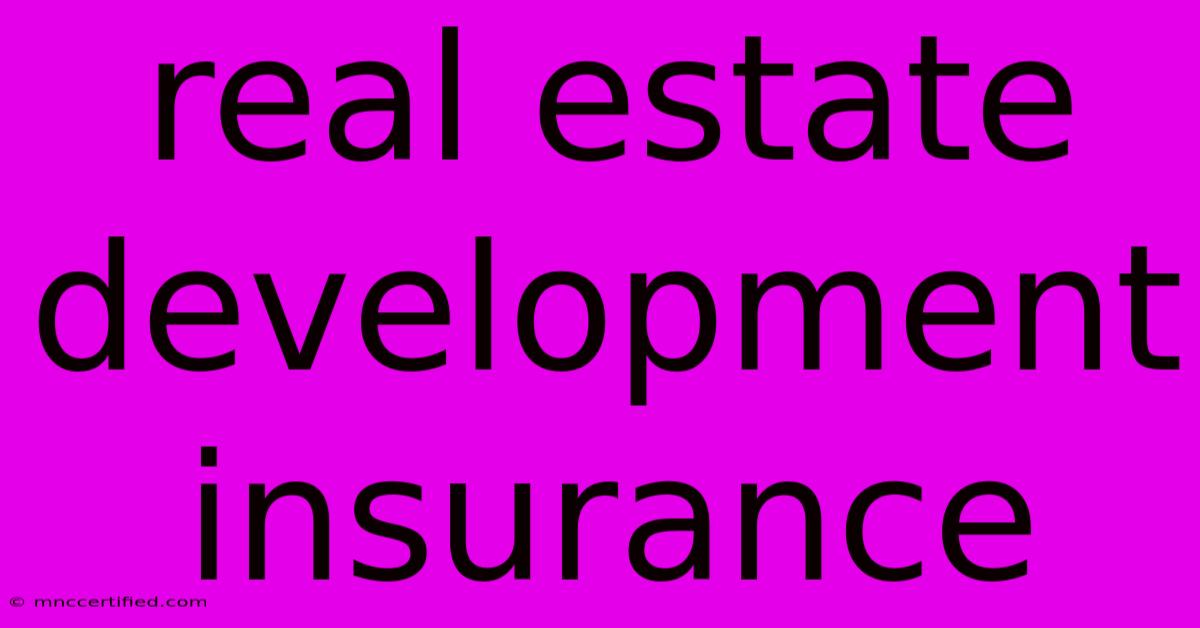Real Estate Development Insurance

Table of Contents
Real Estate Development Insurance: Protecting Your Investment from Foundation to Completion
Real estate development is a high-stakes game. Years of planning, millions of dollars, and countless hours of work can be wiped out in an instant by unforeseen circumstances. That's why securing the right real estate development insurance is crucial, acting as a financial safety net throughout the entire project lifecycle. This comprehensive guide will explore the various types of insurance essential for developers, helping you protect your investment and mitigate potential risks.
Understanding the Risks in Real Estate Development
Before diving into the specifics of insurance, it's important to understand the inherent risks involved in real estate development. These risks can be broadly categorized into:
- Construction Risks: Accidents on site, material defects, delays due to weather or labor issues, and damage to the property during construction.
- Financial Risks: Cost overruns, loan defaults, and market fluctuations impacting profitability.
- Liability Risks: Injuries sustained on the site, damage to neighboring properties, and claims of faulty workmanship.
- Environmental Risks: Discovering contamination on the site, violating environmental regulations, and the cost of remediation.
Key Types of Real Estate Development Insurance
Navigating the world of insurance can be complex. Here's a breakdown of essential policies for real estate developers:
1. Builders Risk Insurance: Protecting Your Construction Project
This is arguably the most crucial policy. Builders risk insurance covers damage or destruction to the building during construction caused by events like fire, windstorms, vandalism, and even accidental damage. It's a critical protection against significant financial losses should a disaster strike before completion. Make sure your policy covers the full replacement cost, not just the market value, particularly during periods of inflation.
2. General Liability Insurance: Protecting Against Third-Party Claims
General liability insurance safeguards your business against claims of bodily injury or property damage caused by your operations. This includes injuries sustained by workers, visitors, or members of the public on the construction site, as well as damage to adjacent properties. The coverage amount should be substantial, reflecting the potential scale of liabilities.
3. Professional Liability Insurance (Errors & Omissions): Protecting Against Professional Mistakes
Also known as Errors & Omissions (E&O) insurance, this policy protects you against claims arising from professional negligence or mistakes in design, specifications, or other professional services you provide. This is particularly important if you're involved in complex development projects or offering design services alongside construction.
4. Workers' Compensation Insurance: Protecting Your Employees
This insurance is legally mandated in most jurisdictions and covers medical expenses and lost wages for employees injured on the job. It protects you from potentially crippling lawsuits arising from workplace accidents. Ensure your policy adequately covers all your employees and complies with all applicable regulations.
5. Environmental Impairment Liability (EIL) Insurance: Protecting Against Environmental Hazards
EIL insurance covers the costs associated with environmental contamination discovered on the site, including cleanup and remediation. This is particularly crucial if you're developing in areas with a history of industrial activity or potential environmental hazards. Investigate thoroughly before purchase to ensure appropriate coverage.
6. Wrap-Up Insurance (OCIP/CCIP): Streamlining Insurance for Large Projects
For larger, complex projects with multiple contractors, a wrap-up insurance policy, such as an Owner Controlled Insurance Program (OCIP) or Contractor Controlled Insurance Program (CCIP), can simplify the process by consolidating coverage under a single policy. This simplifies administration and ensures comprehensive protection for all parties involved.
Choosing the Right Real Estate Development Insurance Provider
Selecting the right insurance provider is as crucial as selecting the right policy. Consider these factors:
- Financial Stability: Choose a provider with a strong financial rating and a history of paying claims promptly.
- Experience: Opt for a provider with extensive experience in real estate development insurance.
- Customer Service: A responsive and helpful provider can make all the difference when you need to file a claim.
- Coverage Options: Ensure the provider offers a range of policies that meet your specific needs and the complexities of your project.
Real estate development insurance is not a luxury; it's a necessity. By understanding the risks involved and securing the appropriate coverage, you can protect your investment and focus on building your project with confidence. Remember to consult with a qualified insurance broker to determine the specific policies and coverage amounts that best suit your individual project requirements. Don't let unforeseen events derail your success—protect your investment today.

Thank you for visiting our website wich cover about Real Estate Development Insurance. We hope the information provided has been useful to you. Feel free to contact us if you have any questions or need further assistance. See you next time and dont miss to bookmark.
Featured Posts
-
Blepharoplasty Test For Insurance
Nov 19, 2024
-
How Much Is Ufe Without Insurance
Nov 19, 2024
-
More Uk Snow Live Weather Update
Nov 19, 2024
-
Joyce Insurance Group Pittston Pa
Nov 19, 2024
-
North Korea Kim Jong Uns Nuclear Push
Nov 19, 2024